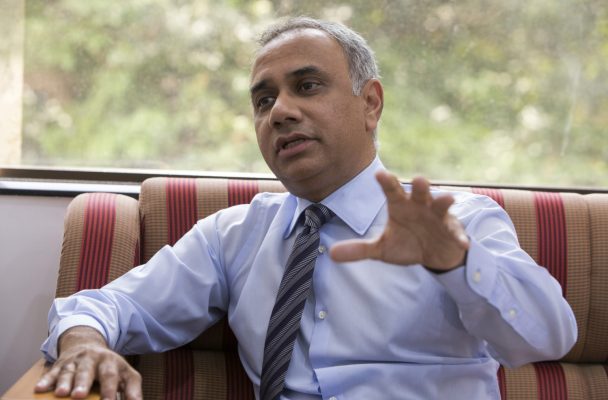Salil Parekh didn’t get much time to settle in after taking over the helm of Infosys. Since becoming Chief Executive Officer in January 2018, the 53-year-old has crisscrossed three continents to meet with customers and employees to get his hands around the challenges facing India’s iconic tech-services giant. He talked with 48 clients in his first three months, and he’s determined to see every single one face to face in the next two quarters. He’s already making tough decisions. He says Infosys has to sacrifice profit margins now by investing in advanced technology and skills in order to capture the opportunities of the ahead. That includes pumping more money into technologies such as the Internet of Things, retraining employees, localising its workforce in the U.S. and building up the sales staff. “To build the future Infosys, we have to make those investments now,” said Parekh. “If we don’t do that now, the real concern is that we won’t be relevant to our clients in the future.” It’s a message that may unsettle investors. On April 16, Infosys shares tumbled after the IT services giant said it expected operating margins to be 22% to 24%, lower than the previous year’s. Parekh contends Infosys has a rare combination of skills and experience that will benefit the company in the years ahead. It’s been working with customers for decades and can use that understanding to help them navigate shifting technology trends, like cloud computing and artificial intelligence. Infosys now reaps $2.8 billion in revenue from such digital services. But the potential market is $200 billion. “We are best positioned to help clients navigate their journey into the future and take them to the next phase,” said Parekh. “Our clients are pushing us because they know we have the capabilities.” Parekh may also cut some big acquisitions, like he did in his previous job. He has already met with the M&A team and asked them to draw up a short list of possible targets that could help buttress its digital capabilities. He’s also on the lookout for “opportunistic things that we can do that will help accelerate our digital pace”. His focus clearly is on urgent challenges at Infosys. Parekh is trying to get the company back to stable footing after the tumultuous tenure of his predecessor. Vishal Sikka arrived in 2014 as a well-respected executive from SAP SE, but quit in August after a clash with the company’s founders over strategy and compensation. Parekh was a surprise choice as CEO. He was plucked from Capgemini SE over a field of internal candidates and former executives. He joined Capgemini in 2000 as part of an acquisition and then built its India business to the point it competed with Infosys and rival Tata Consultancy Services (TCS). Infosys and TCS are pioneers in providing back-office support for the world’s largest corporations, but they’ve had to evolve to go beyond traditional low-margin, labor-intensive work. The country’s $167 billion IT services industry is investing in cloud computing and AI to jump-start growth, as clients from banking to retail turn to automation. Spending on advanced technologies puts pressure on margins. Infosys and its peers are seeing hiring costs rise alongside immigration curbs by administration of Donald Trump. It also needs to install and train a vast workforce unaccustomed to digital services. All that investment won’t get growth back to that of the boom years though. On Friday, Infosys forecast a 6% to 8% increase in revenue this year, a disappointment to many given the slide in margins. Parekh said the forecast is simply realistic. He looked at what clients will do, the overall geography and how the business is doing internally. And cannot promise more. [Bloomberg]
Menu




